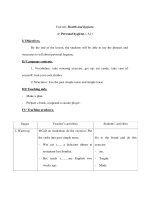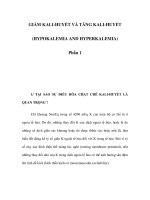Economic Policy Thoughts for Today and Tomorrow phần 1 pdf
Bạn đang xem bản rút gọn của tài liệu. Xem và tải ngay bản đầy đủ của tài liệu tại đây (474.76 KB, 13 trang )
Economic Policy
Thoughts for Today and Tomorrow
Third Edition
Ludwig von Mises
von Mises
Institute
AUBURN,ALABAMA
Originally published 1979 by Regnery/Gateway, Inc., Chicago
(ISBN 0-89526-899-X). Copyright © by Margit von Mises.
Second edition copyright © 1995 by Bettina Bien Greaves.
Third edition copyright © 2006 by Bettina Bien Greaves.
All rights reserved. No part of this book may be reproduced in
any manner whatsoever without written permission except in
the case of reprints in the context of reviews. For information
write the Ludwig von Mises Institute, 518 West Magnolia
Avenue, Auburn, Alabama 36832.
ISBN
13:
978-1-933550-01-5
ISBN 10: 1-933550-01-5
Contents
Introduction by Bettina Bien Greaves vii
Foreword by Margit von Mises xiii
1st Lecture Capitalism 1
2nd Lecture Socialism 17
3rd Lecture Interventionism 37
4th Lecture Inflation 55
5th Lecture Foreign Investment 75
6th Lecture Policies and Ideas 93
Index 107
Introduction
The ideal economic policy, both for today and tomor-
row, is very simple. Government should protect and de-
fend against domestic and foreign aggression the lives
and property of the persons under its jurisdiction, settle
disputes that arise, and leave the people otherwise free
to pursue their various goals and ends in life. This is a
radical idea in our interventionist age. Governments to-
day are often asked to regulate and control production,
to raise the prices of some goods and services and to
lower the prices of others, to fix wages, to help some
businesses get started and to keep others from failing,
to encourage or hamper imports and exports, to care for
the sick and the elderly, to support the profligate, and
so on and on and on.
Ideally government should be a sort of caretaker, not
of the people themselves, but of the conditions which
will allow individuals, producers, traders, workers, en-
trepreneurs, savers, and consumers to pursue their own
goals in peace. If government does that, and no more,
the people will be able to provide for themselves much
better than the government possibly could. This in es-
sence is the message of Professor Ludwig von Mises in
this small volume.
Professor Mises (1881-1973) was one of the 20th cen-
vu
viii ECONOMIC POLICY
tury's foremost economists. He was the author of pro-
found theoretical books such a Human Action,
Socialism,
Theory
and History, and a dozen other works. However,
in these lectures, delivered in Argentina in 1959, he
spoke in nontechnical terms suitable for his audience of
business professionals, professors, teachers, and stu-
dents.
He illustrates theory with homespun examples.
He explains simple truths of history in terms of eco-
nomic principles. He describes how capitalism destroyed
the hierarchical order of European feudalism, and dis-
cusses the political consequences of various kinds of
government. He analyzes the failures of socialism and
the welfare state and shows what consumers and work-
ers can accomplish when they are free under capitalism
to determine their own destinies.
When government protects the rights of individuals
to do as they wish, so long as they do not infringe on the
equal freedom of others to do the same, they will do
what comes naturally—work, cooperate, and trade with
one another. They will then have the incentive to save,
accumulate capital, innovate, experiment, take advan-
tage of opportunities, and produce. Under these condi-
tions,
capitalism will develop. The remarkable economic
improvements of the 18th and 19th centuries and Ger-
many's post-World War II "economic miracle" were due,
as Professor Mises explains, to capitalism:
[I]n economic policies, there are no miracles. You have read in
many newspapers and speeches, about the so-called German
economic miracle—the recovery of Germany after its defeat
and destruction in the Second World War. But this was no
miracle. It was the application of the
principles
of the free
market
economy,
of the methods of capitalism, even though they were
not applied completely in all respects. Every country can expe-
rience the same "miracle" of economic recovery, although I
Introduction ix
must insist that economic recovery does not come from a mir-
acle;
it comes from the adoption of—and is the result of—sound
economic policies, (p. 15)
So we see that the best economic policy is to limit
government to creating the conditions which permit in-
dividuals to pursue their own goals and live at peace
with their neighbors. Government's obligation is simply
to protect life and property and to allow people to enjoy
the freedom and opportunity to cooperate and trade
with one another. In this way government creates the
economic environment that permits capitalism to flour-
ish:
The development of capitalism consists in everyone's having
the right to serve the customer better and /or more cheaply.
And this method, this principle, has, within a comparatively
short time, transformed the whole world. It has made possible
an unprecedented increase in world population, (p. 5)
When government assumes authority and power to do
more than this, and abuses that authority and power, as
it has many times throughout history—notably in Ger-
many under Hitler, in the U.S.S.R. under Stalin, and in
Argentina under Peron—it hampers the capitalistic sys-
tem and becomes destructive of human freedom.
Dictator Juan Peron, elected President in 1946, was in
exile when Mises visited Argentina in 1959, having been
forced out of the country in 1955. His wife, the popular
Eva, had died earlier, in 1952. Although Peron was out
of the country, he had many supporters and was still a
force to be reckoned with. He returned to Argentina in
1973,
was again elected President and, with his new wife
Isabelita as Vice President, ruled until he died ten
months later. His widow, Isabelita, then took over until
x ECONOMIC POLICY
her administration, charged with corruption, was finally
ousted in 1976. Argentina has had a series of Presidents
since then and has made some strides toward improving
her economic situation. Life and property have been ac-
corded greater respect, some nationalized industries
have been sold to private buyers, and the inflation has
been slowed.
The present work is a felicitous introduction to Mises'
ideas.
They are, of course, elaborated more fully in Hu-
man Action and his other scholarly works. Newcomers
to his ideas would do well, however, to start with some
of his simpler books such as
Bureaucracy,
or
The
Anti-
Capitalistic
Mentality.
With this background, readers will
find it easier to grasp the principles of the free market
and the economic theories of the Austrian school that
Mises presents in his major works.
BETTINA
BIEN
GREAVES
February 1995
Introduction xi
Mises' Major Works
(Date of first publication in parentheses)
The Theory of Money and Credit (1912)
Nation, State and Economy (1919)
Socialism (1922)
Liberalism (1927; 1st English translation titled,
The
Free
and Prosperous Commonwealth)
Critique of Interventionism (1929)
Epistemological Problems of
Economics
(1933)
Nationalokonomie (1940) Predecessor to
Human Action; no English translation.
Bureaucracy (1944)
Omnipotent Government (1944)
Human Action (1949)
Planning for
Freedom
(1952)
The Anti-Capitalistic Mentality (1956)
Theory and History (1957)
The Ultimate
Foundation
of
Economic Science
(1962)
Posthumous Publications:
Notes and Recollections (1978)
On the Manipulation of Money and Credit (1978)
Economic Policy (1979)
Money,
Method,
and the Market Process (1990)
Economic Freedom and Interventionism (1990)
Interventionism: An Economic Analysis (1998)
The present book fully reflects tlie
author's
fundamental posi-
tion
for which he was—and still is—admired by followers and
reviled by opponents While each of tlw six lectures can
stand alone as an independent essay, the harmony of
the
series
gives an aesthetic pleasure similar to tltat derived from looking
at the architecture of
a
well-designed
edifice.
—Fritz Machlup
Princeton, 1979
Late in 1958, when my husband was invited by Dr. Al-
berto Benegas-Lynch to come to Argentina and deliver
a series of lectures, I was asked to accompany him. This
book contains, in written word, what my husband said
to hundreds of Argentinian students in those lectures.
We arrived in Argentina several years after Peron had
been forced to leave the country. He had governed de-
structively and completely destroyed Argentina's eco-
nomic foundations. His successors were not much better.
The nation was ready for new ideas, and my husband
was equally ready to provide them.
His lectures were delivered in English, in the enor-
mous lecture hall of the University of Buenos Aires. In
two neighboring rooms his words were simultaneously
translated into Spanish for students who listened with
earphones. Ludwig von Mises spoke without any re-
xin
xiv ECONOMIC POLICY
straint about capitalism, socialism, interventionism, com-
munism, fascism, economic policy and the dangers of
dictatorship. These young people, who listened to my
husband, did not know much about freedom of the mar-
ket or individual freedom. As I wrote about this occasion
in My Years with
Ludzvig
von Mises, "If anyone in those
times would have dared to attack communism and fas-
cism as my husband did, the police would have come in
and taken hold of him immediately, and the assembly
would have been broken up."
The audience reacted as if a window had been opened
and fresh air allowed to breeze through the rooms. He
spoke without any notes. As always, his thoughts were
guided by just a few words, written on a scrap of paper.
He knew exactly what he wanted to say, and by using
comparatively simple terms, he succeeded in communi-
cating his ideas to an audience not familiar with his
work, so that they could understand exactly what he
was saying.
The lectures were taped, and the tapes were later tran-
scribed by a Spanish-speaking secretary whose typed
manuscript I found among my husband's posthumous
papers. On reading the transcript, I remembered vividly
the singular enthusiasm with which those Argentinians
had responded to my husband's words. And it seemed
to me, as a non-economist, that these lectures, delivered
to a lay audience in South America, were much easier
to understand than many of Ludwig von Mises' more
theoretical writings. I felt they contained so much valu-
able material, so many thoughts important for today and
the future, that they should be made available to the
public.
Since my husband had never revised the transcripts
of his lectures for book publication, that task remained
Foreword xv
for me. I have been very careful to keep intact the mean-
ing of every sentence, to change nothing of the content
and to preserve all the expressions my husband often
used which are so familiar to his readers. My only contri-
bution has been to pull the sentences together and take
out some of the little words one uses when talking infor-
mally. If my attempt to convert these lectures into a book
has succeeded, it is only due to the fact that, with every
sentence, I heard my husband's voice, I heard him talk.
He was alive to me, alive in how clearly he demonstrated
the evil and danger of too much government; how com-
prehensibly and lucidly he described the differences be-
tween dictatorship and interventionism; with how much
wit he talked about important historic personalities; with
how few remarks he succeeded in making bygone times
come alive.
I want to use this opportunity to thank my good
friend George Koether for assisting me with this task.
His editorial experience and his understanding of my
husband's theories were a great help to this book.
I hope these lectures will be read not only by scholars
but also by my husband's many admirers among non-
economists. And I earnestly hope that this book will be
made available to younger audiences, especially high
school and college students around the world.
MARGIT VON MISES
New York
June 1979









